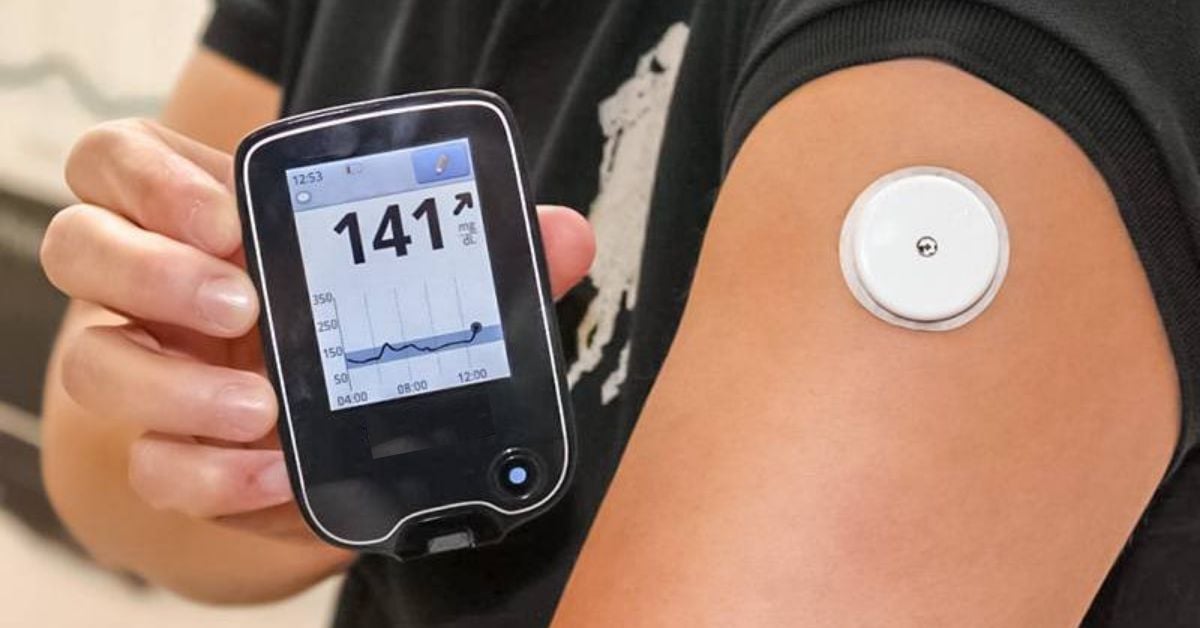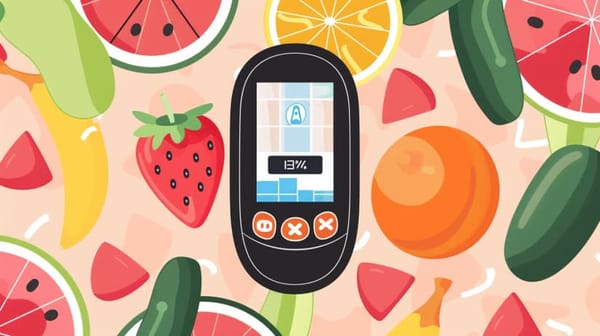I know many people can't afford it or find it ridiculous to spend money on a CGM. But if you've been really thinking about having someone hold your hand during a refeed, maybe really praying for a dry fasting partner – A kind of compromising solution can be found with a CGM. It is also fantastic at building a closer connection with the food you're eating.

What is a CGM?
A Continuous Glucose Monitor (CGM) is a small, wearable device that tracks your blood sugar levels in real-time throughout the day and night. It consists of a tiny sensor inserted under the skin, usually on the abdomen or arm, which measures glucose levels in the interstitial fluid. The sensor wirelessly sends this data to a monitor or a smartphone app, allowing users to see their glucose trends and patterns.

Night-time glucose note: Many people enter the fast from different kinds of preparation diets. Some don't prepare at all (an interesting topic in and of itself). The point is that for many people on a regular diet, they won't witness blood glucose going into the red zone until somewhere around day 3 of the fast. This is why 3 is the magical number. I view day 3 as the wall from Game of Thrones. If you want drastic results for your health, you need to break through the 3-day barrier. Four days is already miles better than stopping at three.
No snacking between meals note: When you eat almost ANYTHING, you will release insulin. This is the reason why some people debate that you shouldn't have tea, coffee, or even chew gum while fasting. These actions release insulin. I believe a big part of the healing process revolves around fixing your insulin resistance, and the fast gives you the opportunity to truly give your pancreas a break (while fixing insulin resistance you might also be fixing thyroid issues – a potential hidden hypothyroidism issue). You want to retrain your body with healthy spikes. When you first exit a fast you are in an extremely insulin-resistant state. All your body has been doing (the deeper you get) is burning fat. Fat inhibits clean carb/glucose burn.
If only they sold Continuous Insulin Monitors! 🙁
Why to not overly spike glucose note: Insulin and cellular resistance is one of the key things that got us into this mess. Let's try to start by not going too crazy. The spikes put extra stress on your pancreas to produce a lot of insulin, which, over time, can lead to insulin resistance. The body is healing, the body is rebuilding. Let's give it the peace and calm it requires without the shock of massive spikes during the refeed.
You'll notice that as the days progress, and you continue a proper refeed, the body will start being able to handle larger and larger amounts of carbohydrates without giving you the spike. THIS is where the magic starts to happen. BURN BABY!
Insulin resistance is our best way to track cellular resistance – the topic I recently talked about in another blog post – And therefore don't sleep on it. I hope this helps you further refine your healing journey and please pass on this information.

What is HRV (Heart Rate Variability)?
Heart Rate Variability (HRV) is a measure of the variation in time between each heartbeat, which is controlled by the autonomic nervous system. Unlike a simple heart rate count, HRV provides insights into the body's stress and recovery states by analyzing the intervals between beats. A higher HRV typically indicates better cardiovascular fitness and a more resilient stress response, while lower HRV can suggest stress, fatigue, or underlying health issues. By tracking HRV, individuals can gain a deeper understanding of their overall health, manage stress, and optimize their physical performance and recovery.

What have I learned about HRV from talking to others and research?
- It varies wildly.
- It is a measure of how much stress your body can withstand.
- The bigger the number, the more of a buffer you have.
- a drop in HRV can give you a few day's heads up about an oncoming illness (even before first symptoms arrive)
- It's my favorite indicator and health marker for progress when healing chronic illness/fatigue.
What are average HRV levels for different age groups?
Let's look at the numbers. The most detailed survey comes from a 2019 study of over 150,000 people in the Netherlands (Tegegne et al. 2020). This study includes both Heart Rate Variability (HRV) and resting heart rate (RHR). The charts below show how HRV changes with age. For teenagers, HRV averages around 80 milliseconds (ms), but it decreases gradually over the years, dropping to about 25ms for people over 75 years old.

While in the throes of my illness, I hovered in the 15-30 range for a year or two. That's when I started tracking. Considering that I am reaching the 80s now is remarkable. The next goal is 100. I believe that I may actually be in better health than I was 5 years ago. To think that I was able to reach this point is something I had nearly given up on.

I am back to working 4 jobs (at maximum capacity). I work in the cryptocurrency start-up space which takes most of my time. The second job is a family with two kids under 4. My third job is my homestead maintenance (greenhouses, chickens, bees, orchards, etc). The fourth job is the dry fasting club.
If I didn't have my various protocols, there's no way I would have been able to heal with the amount of daily work/stress. Dry fasting is miraculous, but at the same time, it's not the end-all-be-all. In fact, I personally think magic mushrooms and mindfulness are more powerful – but let's keep that between us because this is still – The Dry Fasting Club ;)
Some more notes about HRV.







